
West Bank: A new front opening up in Israel-Hamas war?
Well, for some analysis, Douglas Herbert is with me now. And Douglas, look, this is a major Israeli operation in the West Bank. Some say it’s the largest in years there.
Are we seeing, do you think, a new front opening in the war, while of course we have the ongoing massive conflict in Gaza and the almost daily exchange of fire along the Lebanese border? For a number of reasons, I don’t think you’re going out on a limb by suggesting we’re essentially seeing the opening of a third front.
Look, the West Bank, the occupied West Bank, has been on low simmer in terms of violence, at least relative to the all-out war that we’ve seen in Gaza, Israel-Hamas war in Gaza, and also the increasingly violent confrontations and volleys of back and forth artillery fire on the border with Lebanon, northern Israel, southern Lebanon, with Hezbollah.
So if you’re going to add this third front now, what we have been seeing now, yes, since the beginning of the war, what has been a constant of this conflict are these raids, near-daily, if not daily, raids by IDF Israeli Defense Forces on often densely populated areas, refugee camps in these areas, in the name of, as Israeli Defense Forces put it, "rooting out militants," targeting militants. They would see these as pinpoint operations where they have precise targets and they are doing all they can to limit civilian harm. And Palestinians clearly have a very different take on this. They see sort of a triumvirate of things colluding against them right now. They see both these raids stepping up in intensity. We’ve seen now airstrikes. These types of airstrikes that we’ve really seen in the past several days have been extremely rare in the West Bank.
So in addition to just military on-the-ground raids who have the airstrikes, but alongside that, and this is coupling those tensions and adding to this overall sense of almost overbearing violence or incipient violence in the daily lives of Palestinians, are these emboldened Palestinian settlers. Emboldened I think is a fair word to use because- Israeli settlers. Israeli settlers who have been more and more taking, attacking Palestinian communities, Palestinian farmers taking over their land, chasing them from their land.
Even with impunity, and when I say with impunity what I mean by that is often with Israeli security forces seeing it happen, but standing by and doing little or nothing to intervene to try to stop it. So you have that sense alongside these raids by official military forces, these packs of Israeli settlers attacking Palestinian communities, more and more of these types of attacks. Plus alongside this, I said there’s a third element is what seems to be a stepped up seizure of settlement building. That is seizure of Palestinian lands in the name of settlement building. We recently saw announcements of more settlements around UNESCO site, World Heritage Site in Bethlehem area. And this sense of increasing Israeli encroachment on Palestinian land, I say a sense because this is how the Palestinians see it, that their land is being taken over, flouting the will of the international community, which says these settlements are illegal.
All of this is adding to a sense that the West Bank is not something that’s just happening this week and becoming a new front.
It has been a new front. We’re just seeing the reality of it now in much heavier attacks, assaults and explosions. Right. You mentioned the international community. What kind of reaction has there been to this Israeli incursion in the last few days? Yeah. Well, the international community, let’s boil it down, the United Nations and specifically the United Nations Human Rights Office has expressed a concern and growing alarm in what it sees as a flagrant violation of international laws and norms in what they see as overly aggressive Israeli military tactics in these areas.
Now like I said, Israel has time and again pushed back against these allegations from human rights groups, from the UN itself, saying we, more than any other army in the world, we take absolutely every precaution, more than any professional army you can find to ensure that civilians are protected, that civilians are not harmed.
But the reality is from witnesses on the ground from human rights groups, they say that is simply not true. They say that the evidence of what they have witnessed flies in the face of those Israeli assertions that they are taking all precautions to ensure civilian safety. They say that this is an increasingly explosive situation and one which risks in the view of many on the ground of yes, further heightening this conflict.
I mentioned the initial two-flip fronts, we’ve been talking about it, right? Gaza, Hezbollah, southern Lebanon with Iran as their overseers. Right now the West Bank is becoming very much an operational active new front in this war, whether it is officially recognized as such.
And just finally, Doug, let’s talk briefly about what’s happening in Gaza because there has been some kind of agreement between the World Health Organization and Israel to pause fighting in a number of areas for three days and that to allow a polio vaccination campaign of children to get underway. There are some concerns about it.
Will it work? The fears for, yes, there has been an agreement reached between the humanitarian officials and Israel.
There will be, according to the agreement, three phases of which the first will be in the central Gaza Strip area will be a three-day vaccination campaign running from six in the morning to three in the afternoon. Ultimately, about 640, 650,000 Palestinian children will be on the receiving end of these vaccinations.
There is the terms of the deal also call for further phases, unspecified dates and logistics yet but in the northern and southern areas of the Gaza Strip. The question is, one, it doesn’t apply to all of the Gaza Strip, just these designated areas for the vaccination campaign.
Hamas says is not enough. But also the question is, in the past, humanitarian groups have seen their vehicles fired on by Israeli security forces, Israeli security forces saying they were targeting militants, which is the familiar line, but they have fears that it will not perhaps run according to plan and they want to ensure that those delivering these vaccines and delivering these vaccinations will be able to operate safely in these designated so-called humanitarian pause zones.
Full Video Teguh Suwandi X Msbreewc Viral 7 Menit Original
Teguh Suwandi X Msbreewc 7 Menit video took the internet by storm and amazed viewers on va...
VIRAL VIDEO LINK: Yanti Taiwan 1 Minute 49 Seconds Trending on Social...
Discover why the viral link video of Yanti Taiwan, lasting 1 minute and 49 seconds, is bei...
Woman dances to Aaj Ki Raat in metro in viral video. Internet is not h...
A woman danced to Tamannaah Bhatia’s ‘Aaj Ki Raat’ in a metro, sparking mixed reactions on...
June 29 Singam Stack Evening Winners
Latest results for the Singam Pinnacle Lottery draw from the Arunachal State Lottery, alon...
